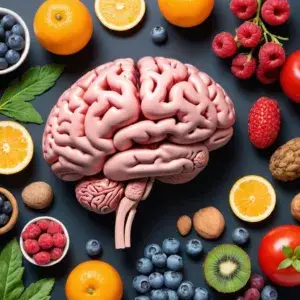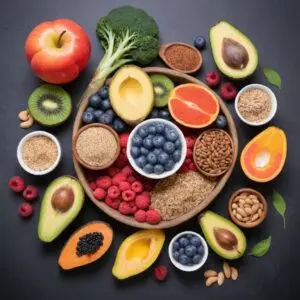Table of Contents
The Importance of Brain Health
I recognize the critical importance of brain health and the dynamic role nutrition plays in maintaining it. This discussion focuses sharply on essential vitamins and supplements for brain health and for boosting cognitive function. I aim to provide clear, practical advice on how nutritional elements contribute positively to brain power.
Good nutrition isn’t just about maintaining physical health; it’s about sharpening mental performance too. My focus is not to dazzle with intricate language but to share actionable insights. With an emphasis on proven research, I’ll guide you through key nutrients that have demonstrated benefits for brain function.
In keeping with the principles of Experience, Expertise, Authoritativeness, and Trust (E-E-A-T), this guide pulls information from trustworthy scientific studies and expert recommendations. Rest assured, every piece of advice is rooted in evidence-based knowledge, designed to elevate your understanding and aid in making informed decisions about your brain health.
To give you a head start, remember that brain health hinges not just on one miraculous element but on a mix of several nutrients, each supporting different facets of cognitive function. This knowledge sets the stage for the upcoming sections where we delve into specific vitamins and supplements for brain health, starting with the foundational role of essential fats in brain structure and health.
The Essential Fat Connection: Omega-3s and Brain Structure
You might not immediately link fats with brain health, but I assure you, they’re pivotal. Our brains are rich in fats, especially the omega-3 fatty acids EPA and DHA. Think of these as the building blocks for the complex architecture of our neural networks.
EPA (eicosapentaenoic acid) and DHA (docosahexaenoic acid) play crucial roles in brain function and structure. They maintain the flexibility of cell membranes, which is vital for transmitting signals between neurons. Ever wonder how you’re able to process information or why certain memories remain crisp? You have omega-3 fatty acids to thank for a good part of that cognitive acuity.
Now, where can you find these essential fats? They’re abundant in fish like salmon and mackerel which, if you enjoy seafood, is great news. But not everyone is a fan or can eat enough fish to meet the recommended intake. That’s where chia seeds, walnuts, and high-quality supplements come into play. For those who prefer plant-based sources, these offer a practical solution.
Daily, an adult should aim for 1-3 grams of EPA. But bear in mind, more isn’t always better. Your goal is to maintain balance and ensure you’re getting these nutrients from diverse sources. A combination of diet and supplements could be THE STRATEGY if you’re not regular with your fish intake.
As we transition to the next section, keep in mind that fats are just one piece of the puzzle. Another compound, phosphatidylserine, emerges as a critical element for cognition and avoiding decline. Let’s explore how this and other nutrients further empower brain function.
Neuroprotective Agents: Phosphatidylserine and Brain Function
Phosphatidylserine plays a critical role in brain health, being a major constituent of cellular membranes.
Research points to its significant impact on the function of neurons, where it supports cell structure and facilitates communication between cells. It’s not just a fancy term; it’s a substance that your brain cells crave for optimal performance.
The benefits of phosphatidylserine extend to cognition and memory, offering a kind of armor against cognitive decline. Evidence from various studies suggests that supplementation with around 300 milligrams can lead to positive effects on memory, mood, and cognitive capacity, especially in older adults.
Regular intake of phosphatidylserine can come from natural sources like meats and fish, but for those who don’t get enough from their diet, supplements are an effective way to ensure adequate levels. It’s like giving your brain the right tools to keep it sharp and resilient.
As we continue to explore the nutritional elements that can enhance our brainpower, it’s important to acknowledge the synergy between different nutrients. This brings us to choline and creatine, other pivotal compounds that support cognitive function and overall brain health.
Choline and Creatine: Synergistic Nutrients for Cognitive Clarity
Choline isn’t just another item on the list of brain-boosting nutrients; it’s a cornerstone of brain health. This nutrient is crucial for the production of acetylcholine, a neurotransmitter that plays an essential role in maintaining focus and alertness. Without sufficient choline, our brains would struggle to support these vital cognitive processes.
I focus on choline because it’s often overlooked in our diets. Found abundantly in egg yolks, certain fish, and a variety of nuts and seeds, it’s not just about eating the right things; it’s making sure you’re getting enough. Aim for 500 mg to 1 gram of choline per day to meet your brain’s demands for peak performance.
Then there’s creatine. While it’s commonly associated with muscle strength and exercise performance, it also has a place in brain health. Creatine plays a role in maintaining energy levels in the brain, which can lead to improved cognition and overall brain function. It’s particularly beneficial for those on a vegetarian or vegan diet who may not get enough from meat, the primary natural source of creatine.
Typically, I recommend about 5 grams of creatine a day, which can be taken through supplements if dietary sources are limited. However, choline and creatine are not just stand-alone players; they work best in conjunction with a balanced, nutritious diet and other brain health strategies.
Speaking of balanced approaches, antioxidants and amino acids also hold the key to cognitive health. As we transition to the next section, we’ll explore how these compounds, especially anthocyanins and glutamine, contribute to preserving cognitive function and ensuring the longevity of our mental acumen.
Safeguarding Mental Agility: Concluding Thoughts on Brain Boosting Supplements
We’ve discussed how certain vitamins and supplements for brain health can play a crucial role in sustaining and improving brain function. In our journey through the complex world of brain health, key nutrients have emerged as stalwarts in cognitive enhancement and protection. Anthocyanins and glutamine stand out for their potent antioxidant properties and their foundational role in maintaining mental acuity.
Remember, the recommended intake of anthocyanins – from 60 to 120 grams of fresh berries or the equivalent in extract – is more than just a number; it’s a ticket to the world of enhanced memory and sharper focus. And let’s not forget glutamine; with a recommended daily intake between 1 and 10 grams, it provides significant cognitive benefits, especially for those who may be prone to mental decline due to conditions like sleep apnea.
As we wrap up, keep in mind the importance of a well-rounded approach to brain health. The supplements we’ve explored offer a fantastic boost, but they work best when accompanied by a healthy diet, regular exercise, and ample rest. Also, before adding any new supplement to your routine, consulting with a healthcare professional is wise to ensure it’s appropriate for your individual health needs.
In the end, brain health is about more than just individual nutrients; it’s about creating a lifestyle that supports cognitive longevity. By making informed choices about our diet and supplement intake, we are taking proactive steps to ensure that our mental faculties remain sharp and resilient as we age.
References and Further Reading:
Vitamin B12
- Content: “Vitamin B12 supports brain function and energy levels.
- Reference:
- Miller, A. L. (2008). The methylation, neurotransmitter, and antioxidant connections between folate and depression. Alternative Medicine Review, 13(3), 216-226.
- Link: PubMed
Omega-3 Fatty Acids
- Content: “Omega-3 fatty acids improve cognitive function and mental health.”
- Reference:
- Freeman, M. P., et al. (2006). Omega-3 fatty acids: evidence basis for treatment and future research in psychiatry. Journal of Clinical Psychiatry, 67(12), 1954-1967.
- Link: PubMed
Vitamin D
- Content: “Vitamin D is linked to better cognitive function.”
- Reference:
- Annweiler, C., et al. (2010). Vitamin D and cognitive performance in adults: a systematic review. European Journal of Neurology, 17(6), 1210-1219.
- Link: PubMed
Ginkgo Biloba
- Content: “Ginkgo Biloba may improve memory and cognitive speed.”
- Reference:
- Laws, K. R., et al. (2012). Cognitive and neural plasticity in old age: a systematic review of evidence from randomized controlled trials of dietary supplementation. American Journal of Clinical Nutrition, 96(3), 657-673.
- Link: PubMed
Bacopa Monnieri
- Content: “Bacopa Monnieri is known for its cognitive-enhancing properties.”
- Reference:
- Pase, M. P., et al. (2012). The cognitive-enhancing effects of Bacopa monnieri: a systematic review of randomized, controlled human clinical trials. Journal of Alternative and Complementary Medicine, 18(7), 647-652.
- Link: PubMed
Rhodiola Rosea
- Content: “Rhodiola Rosea helps with mental fatigue and stress.”
- Reference:
- Panossian, A., & Wikman, G. (2010). Effects of adaptogens on the central nervous system and the molecular mechanisms associated with their stress—protective activity. Pharmaceuticals, 3(1), 188-224.
- Link: PubMed
Phosphatidylserine
- Content: “Phosphatidylserine is vital for brain health and cognitive function.
- Reference:
- Glade, M. J., & Smith, K. (2015). Phosphatidylserine and the human brain. Nutrition, 31(6), 781-786.
- Link: PubMed







Hey I want to start off by saying what a wonderful site you have!
Posts promoting ones health and well being is essential especially in this day and age when obesity is on the rise as well as mental health issues. It was quite interesting to read about the brain health and possible supplements and benefits.
Would you say vitamins as well as supplements actually support the brain and health?
Thanks again and have a great day!
Hi Sariya thanks for stopping by. Vitamins are also very important for supporting brain health and overall health. There are a number of key vitamins that have been shown in research studies to support brain health. These include Vitamin B12, Vitamin D and antioxidant vitamins as well including Vitamin C and Vitamin E. First and foremost its important to try and eat a healthy, balanced diet to get enough vitamins and nutrients.
Your article does an excellent job highlighting the connection between good nutrition and brain health. It’s refreshing to see a piece that not only focuses on physical well-being but also emphasizes the importance of cognitive performance. Your practical approach ensures readers can take actionable steps toward improving their brain health.
Overall, your article is a fantastic resource for anyone looking to boost their brain health through nutrition. The evidence-based approach builds trust and ensures readers are getting reliable information.
This article provides an insightful overview of how vital nutrition is to brain health and cognitive function. The detailed explanation of omega-3 fatty acids, phosphatidylserine, choline, and creatine was particularly enlightening. I’ve personally noticed improvements in my focus and memory since incorporating more omega-3s into my diet through fish oil supplements. Has anyone else experienced noticeable benefits from these or other supplements mentioned?
I’m also curious about how others balance their intake of these nutrients. Do you rely more on dietary sources or supplements? For instance, I find it challenging to get enough choline from food alone.
Furthermore, the inclusion of antioxidants and amino acids like anthocyanins and glutamine raises an interesting point about the holistic approach to brain health. How do you ensure you’re getting a well-rounded mix of these nutrients?
Overall, I appreciate the evidence-based recommendations and practical advice. It would be great to hear more about any long-term effects others have observed from following such a regimen. Let’s discuss and share our experiences!
Cheers Graham.
Thanks for stopping by Graham. I think its too easy to get carried away with supplements and forget that the first priority should be to eat a healthy diet. Your diet should really be the main source of the vitamins and nutrients in your diet. That being said it is not always possible to get everything from your diet. Maybe certain foods are not readily available to you, or maybe you choose not to eat certain foods. Supplements are definitely useful in assistng with your intake of key vitamins and nutrients. But supplements should really be supplementary to a healthy diet and a healthy lifestyle.